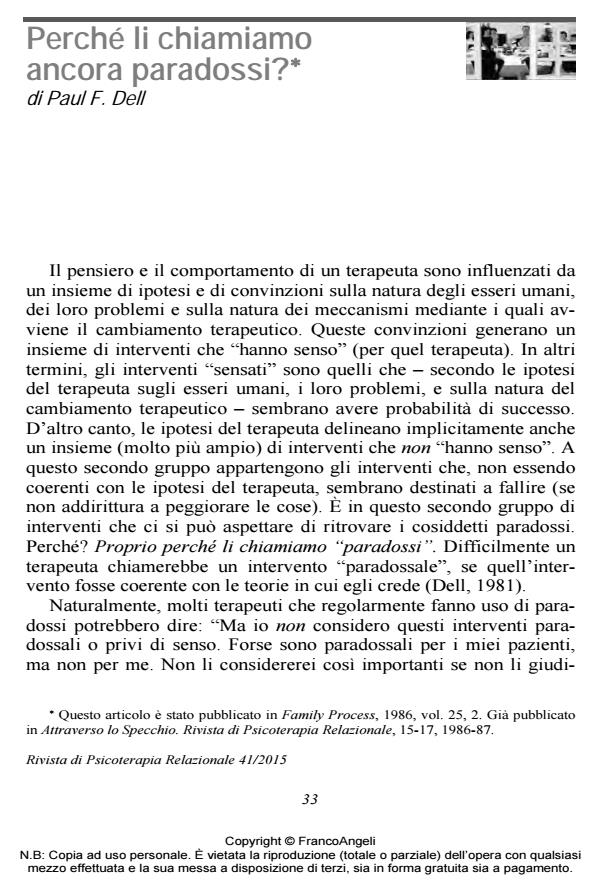Perché li chiamiamo ancora paradossi?
Titolo Rivista RIVISTA DI PSICOTERAPIA RELAZIONALE
Autori/Curatori Paul F. Dell
Anno di pubblicazione 2015 Fascicolo 2015/41
Lingua Italiano Numero pagine 20 P. 33-52 Dimensione file 75 KB
DOI 10.3280/PR2015-041005
Il DOI è il codice a barre della proprietà intellettuale: per saperne di più
clicca qui
Qui sotto puoi vedere in anteprima la prima pagina di questo articolo.
Se questo articolo ti interessa, lo puoi acquistare (e scaricare in formato pdf) seguendo le facili indicazioni per acquistare il download credit. Acquista Download Credits per scaricare questo Articolo in formato PDF

FrancoAngeli è membro della Publishers International Linking Association, Inc (PILA)associazione indipendente e non profit per facilitare (attraverso i servizi tecnologici implementati da CrossRef.org) l’accesso degli studiosi ai contenuti digitali nelle pubblicazioni professionali e scientifiche
- Ruesch J., Bateson G. (1951). Communication: The social matrix of psychiatry. New York: W.W. Norton (trad. it.: La matrice sociale della psichiatria. Bologna: Il Mulino, 1976).
- Shaw R. (1982). Principles of contextual therapy. Workshop presented at the Boston Center for Contextual Study, Boston, MA.
- Stolzenberg G. Can an inquiry into the foundations of mathematics tell us anything interesting about mind? In: Miller G.A., Lenneberg E. (eds.), Psychology and Biology of language and thought. New York: Academic Press (Reprinted in excerpted form in Watzlawick P. (ed.), The invented reality, New York: W.W. Norton, 1984).
- Watzlawick P. (1984). The invented reality. New York: W.W. Norton.
- Watzlawick P., Weakland J., Fisch R. (1974). Change: Principles of problem formation and problem resolution. New York: W.W. Norton (trad. it.: Change. Roma: Astrolabio, 1974).
- Bateson G. (1972). The science of mind and order. In: Bateson G., Steps to an ecology of mind. New York: Ballantine Books (trad. it.: Verso un’ecologia della mente. Milano: Adelphi, 1976).
- Bateson G. (1979). Mind and nature: A necessary unit. New York: Dutton E.P..(trad. it.: Mente e natura. Milano: Adelphi, 1984).
- Berenson D. (1985). The OUT Workshop. Princeton, NJ.
- Dell P.F. (1981). Some irreverent thoughts on paradox. Family Process, 20: 37-42.
- Dell P.F. (1981). Paradox Redux. Journal of Marital and Family Therapy, 7: 127-134.
- Dell P.F. (1982). Beyond homeostasis: Toward a concept of coherence. Family Process., 21: 21-41.
- Dell P.F. (1982). Pathology: The original sin. Lecture presented to the First International Conference on Epistemology, Psychotherapy and Psychopaholoy, Houston, TX.
- Dell P.F. (1983). Clinical epistemology: A psychology for networking. lnvited plenary lecture presented to the 2lst annual meeting of the Association for Humanistic Psychology, Toronto, Ontario, Canada.
- Dell P.F. (1983). From pathology to ethics. Family Therapy Networker, 7: 29-31, 64.
- Dell P.F. (1984). Why family therapy should go beyond homeostasis: A Kuhnian reply to Tyano, Carel and Ariel. Journal of MaritaI and Family Therapy, 10: 351-35.
- Dell P.F. (1985). Understanding Bateson and Maturana: Toward a biological foundation for the social sciences. Journal of Marital and Family Therapy, 11: 1-20.
- Dell P.F. (1985). Review of P. Watzlawick’s “The lnvented Reality”. Family Process, 24: 290-294.
- Gellner G.E. (1974). Legitimation of belief. New York: Cambridge University Press.
- Glasersfeld E. von (1984). An introduction to radical constructivism. In:
- Watzlawick P. (ed.). The invented reality. New York: W.W. Norton.
- Glasersfeld E. von (1984). Reconstructing the concept of knowledge. Paper presented at the Seminar on Constructivism, Archives of Jean Piaget, Geneva, Switzerland.
- Kuhn T.S. (1970). The structure of scientific revolutions (2nd edition). Chicago: University of Chicago Press.
- Maturana H.R. (1970). Neurophysiology of cognition. In: Garvey P. (ed.), Cognition: A multiple view. New York: Spartan.
- Maturana H.R. (1978). Biology of language: The epistemology of reality. In: Miller G.A., Lenneberg E. (eds.), Psychology and Biology of language and thought. New York: Academic Press.
- Maturana H.R. (1986). The biological foundation of self-consciousness and the physical domain of existence. Unpublished manuscript.
- Planck M. (1971). Scientific autobiography and other papers. Westport, CT: Greenwood Press.
Paul F. Dell, Perché li chiamiamo ancora paradossi? in "RIVISTA DI PSICOTERAPIA RELAZIONALE " 41/2015, pp 33-52, DOI: 10.3280/PR2015-041005